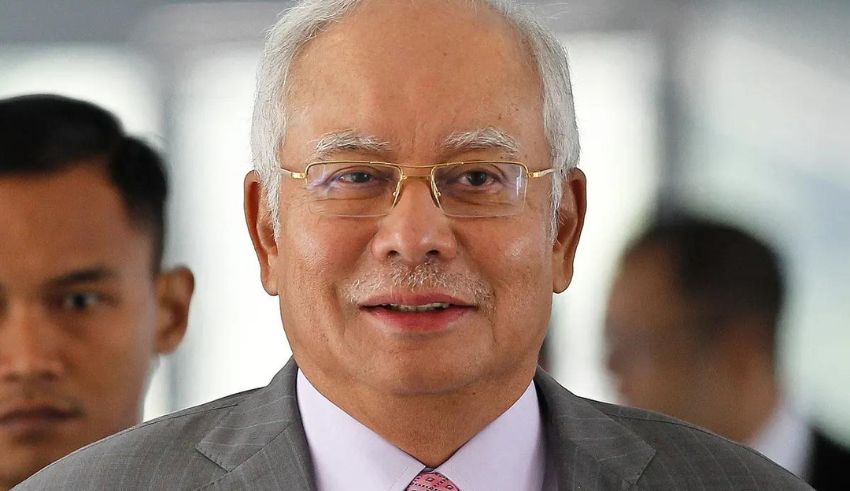

(C) The Guardian
On February 2, 2024, the Malaysian Pardons Board announced that it had reduced former prime minister Najib Razak‘s jail sentence from 12 years to six years, and his fine from RM210 million (US$44.5 million) to RM50 million. The decision was made by the previous King, Sultan Abdullah Ahmad Shah, who chaired the board’s meeting on January 29, before he stepped down as the monarch on January 31.
Najib, 70, was convicted of corruption and money laundering in July 2020, for his involvement in the 1Malaysia Development Berhad (1MDB) scandal, which saw billions of dollars siphoned from the state fund. He was found guilty of abusing his power to receive RM42 million from SRC International, a former subsidiary of 1MDB, into his personal bank accounts. He was sentenced to 12 years in jail and fined RM210 million by the High Court, and his conviction and sentence were upheld by the Court of Appeal and the Federal Court.
Najib has served 17 months of his prison term, and has agreed to be released on August 23, 2028, or August 23, 2029, if he fails to pay the fine. He is also facing several other charges related to the 1MDB scandal, which are still pending in court.
The Pardons Board’s decision has sparked outrage and disbelief among many Malaysians, especially the victims and the families of the 1MDB scandal, who have been waiting for justice and accountability for years. They have expressed their frustration and disappointment that Najib has been given a lenient and unfair treatment, and that he has escaped the full consequences of his crimes.
They have also questioned the legality and the rationale of the decision, and accused the board of being influenced and pressured by political and personal factors. They have demanded an explanation and a review of the decision, and called for a reform and an overhaul of the judicial system.
The decision has also generated criticism and concern from the international community, especially the US and Singapore, which have been investigating and prosecuting the 1MDB case. They have warned that the decision could undermine the credibility and the integrity of the Malaysian judiciary, and could send a wrong signal to the perpetrators and the enablers of corruption and money laundering.
The decision has also exposed and deepened the divisions and the tensions within Malaysian society and politics, as some have supported and welcomed the decision, while others have opposed and condemned it. The decision has also reflected and affected the relations and the dynamics between the monarchy and the government, and between the ruling and the opposition parties.
The Pardons Board’s decision has various implications for the Malaysian judiciary and democracy, such as:
The decision will erode the public confidence and trust in the judiciary, as it will cast doubt and suspicion on the independence and the impartiality of the judges and the courts, and on the consistency and the transparency of the laws and the procedures. The decision will also create a perception and a reality of a double standard and a selective justice, where the powerful and the privileged can get away with their crimes, while the ordinary and the disadvantaged are denied their rights.
The decision will affect the deterrence and the prevention of corruption and money laundering, as it will reduce the costs and the risks for the offenders and the facilitators, and will increase the incentives and the opportunities for them. The decision will also weaken the enforcement and the prosecution of the existing and the future cases, and will hamper the cooperation and the coordination with the foreign and the regional authorities.
The decision will influence the future direction and prospects of Malaysian democracy and development, as it will shape and sway the preferences and choices of the Malaysian people and leaders. The decision will also highlight and test the principles and values of Malaysian democracy, such as the rule of law, the separation of powers, and the accountability of the public officials. The decision will also determine and define the role and position of the Malaysian judiciary, as either a guardian or a hindrance of Malaysian democracy and development.
The stepping down of Piyush Gupta from the post of CEO of DBS Bank came after 15 years of leading…
The Delhi Directorate of Education releases 2025-26 marks for year-end tests in school levels 6 through 11. Online test data…
Singapore will further cement its status as an important basketball destination when it hosts three FIBA 3x3 events in 2026…
Jewel Section E, directed by Theodore Boborol and starring Ashtine Olviga as Jay-Jay Mariano, Andres Muhlach as Mark Keifer Watson,…
Cebu Pacific celebrates the delivery of its very first aircraft for 2025, the 459-seat Airbus A330neo, delivered at Ninoy Aquino…
March 29, 2025, will deliver the first solar eclipse of the year when observers from numerous continents can witness this…
This website uses cookies.
Read More